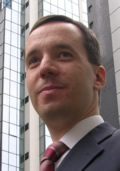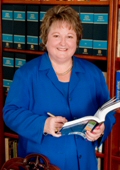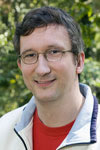ITU Workshop at 3rd IGF Meeting
Including Accessibility and Human Factors in the Universalization of the
Internet - How to reach persons with disabilities, the 10% of the next
billion
|
|
Hyderabad, India, 4 December 2008 |
Contact: Stefano POLIDORI |
|
 Fernando Botelho
Fernando Botelho
Mais Diferenšas and Literacy Bridge
Fernando Botelho is an international consultant who
manages projects in the areas of trade development,
poverty reduction, technology, and disability.
Fernando's experience includes managing the
Visionaris Award, a partnership between Ashoka and
UBS AG, in Argentina, Brazil, and Mexico. Before
coming to UBS Philanthropy Services in Zurich,
Fernando worked for the International Trade Centre
UNCTAD/WTO, an agency of the United Nations in
Geneva. At ITC, Fernando led the development of the
first methodology for the integration of
professionals with disabilities in the services
export sector. Before joining ITC, Fernando was
Director of Technology at a New York NGO where he
led the development of eSight.org, a groundbreaking
online community for the professional advancement of
people with disabilities.
Fernando has published and has been interviewed on
trade, open source software, public policy, and
disability topics. He has degrees from Georgetown
University and Cornell University. |
 Peter Major
Peter Major
ITU-R
I am Peter Major, the head of Space Administrative
Software Division of the Radiocommunication Bureau
of the International Telecommunication Union, a UN
specialized agency in Geneva. I joined the ITU in
1986. My main task, as head of division, is to
provide information technology framework in close
cooperation with the Space Services Department of
the Bureau to support its regulatory activities
related to space radiocommunication. I have
participated in the implementation of the results of
the World Radiocommunication Conferences and I have
been managing analysts, programmers and technical
staff helping me in these activities.
In 1994 I initiated a fascinating project: the
design and implementation of an internet based
application which gives instant access to our space
network systems database. The system is being used
worldwide and it has been upgraded many times during
its operation.
Presently we try and enhance it to respect
recommendations and requirements on accessibility
for visually impaired people to the web.
In addition to my managerial tasks and development
work I give presentations in seminars and workshops
in Geneva and abroad and I advise administrations on
a regular basis. |
 Dipendra Manocha
Dipendra Manocha
Daisy Consortium
Mr. Dipendra Manocha is working as the Developing
countries coordinator with the DAISY Consortium. He
is managing trustee of the Saksham Trust. He worked
as Asst. Project Manager for the DAISY For All
Project. He is the elected president of the DAISY
Forum of India. He worked as Director IT & Services
at the National Association for the Blind, New
Delhi, India from 1993 till July 2008. He also
worked as consultant to the Delhi University for
establishing the resource centre for persons with
disability. After completion of post graduation and
research degree from Delhi University he left the
Ph.D. in between to work for the mission of
providing information and content in accessible
format to persons with print disability. During the
past decade of work he has managed or coordinated
several technological development or implementation
projects such as:
• Establishment of IT training facility for persons
with blindness.
• Development of Hindi Language Braille
transcription software
• Establishment of DAISY Resource Centre in India
under the Daisy for All Project to introduce DAISY
Standards in South Asian countries.
• Establishment of Digital library for print
disabled.
• Content Creation Project for University books in
Braille, E-Text and Talking Books format being
supported by Ministry of Information and
communication Technology, Government of India.
• Development of Screen Reading Software for Indian
Languages.
• Establishment of equipment distribution centre for
persons with blindness
• Audio Description of films
During this period he has held the following posts:
• Chairman Youth Committee of the Asian Blind Union
• Chairman ICT Access Forum of India
• Member of the core group on Accessibility under
the office of Chief commissioner for persons with
disability, government of India
Recognitions:
• He is selected as Ashoka Fellow and recognised as
a social entrepreneur
• National Award by government of India for
contributions for community development in the area
of disability in 2005
• National Leadership award in the area of
disability given by the president of India 2007. |
 Andrea Saks
Andrea Saks
Convener, Joint Coordination Activity on Accessibility and Human Factors (JCA-AHF), ITU
Andrea Saks is a known advocate for ICTs for persons with disabilities.
Her father, Andrew Saks, together with James C. Marsters and Robert
Weitbrecht were pioneers of deaf telecommunications using surplus
teletypewriters and modems – the precursors of textphones and today’s
real-time text messaging. She grew in a family of two deaf parents and
assisted them from an early age as their interface with the hearing world:
getting doctors’ appointments, arranging guests’ visits, etc.
She took that role to the next level when she relocated from the US to the
UK in 1972 to promote the use of textphones internationally. She was able to
successfully lobby the British Government Post Office (the then-regulator of
telecommunications) to allow the first transatlantic textphone conversation
(1975) and to grant a license for connection of text telephones on the
regular telephone network.
Her first involvement with ITU standardization activity started in 1991 and
has ever since increased in scope. Self-funded, she currently attends many
ITU-T study group and focus group meetings promoting the inclusion of
accessibility functionality in systems being standardized by ITU, such as
multimedia conferencing, cable, IPTV and NGN. After the recent creation of
ITU-D Q20/1 on accessibility matters by WTDC-06, she also started attending
that group and now performs as a bridge between the two sectors on the
issue.
She has been a key person in the creation of all accessibility events in
ITU, and currently is the convener of the recently formed joint coordination
activity on accessibility and human factors, as well as the coordinator of
the Internet Governance Forum’s Dynamic Coalition on Accessibility and
Disability.
|
 Shadi Abou-Zahra
Shadi Abou-Zahra
(W3C Web Accessibility Initiative)
Shadi Abou-Zahra coordinates WAI outreach in Europe,
and accessibility evaluation techniques. He is the
Activity Lead of the WAI International Program
Office, which includes groups that are responsible
for education and outreach, coordination with
research, general discussion on Web accessibility,
coordination with the WAI Technical Activity, and
WAI liaisons with other organizations including
standards organizations and disability groups. Shadi
chairs the W3C Evaluation and Repair Tools Working
Group (ERT WG), is a staff person of the WAI Ageing
Education and Harmonisation (WAI-AGE) project, and
participates in the W3C Education and Outreach
Working Group (EOWG). |
 Cynthia D. Waddell
Cynthia D. Waddell
Executive
Director, International Center for Disability
Resources on the Internet (ICDRI)
Cynthia D. Waddell is the Executive Director and
Law, Policy and Technology Subject Matter Expert for
the International Center for Disability Resources on
the Internet (ICDRI), an internationally recognized
public policy center based in the United States
working for the equalization of opportunities for
people with disabilities.
She is the author of the first accessible web design
standard in the United States in 1995 that led to
recognition as a best practice by the federal
government and contributed to the eventual passage
of legislation for Electronic and Information
Technology Accessibility Standards (Section 508).
She also served as the Accessibility Expert (Built
Environment and Accessible ICT) for the UN Ad Hoc
Committee drafting the Convention on Rights of
Persons with Disabilities.
A frequent keynote speaker and writer, Cynthia
Waddell is the co-author of the books, Constructing
Accessible Web Sites and Web Accessibility: Web
Standards and Regulatory Compliance. Named to the
“Top 25 women on the Web” by Webgrrls International
in 1998, she received the first U.S. Government
Technology Magazine award in 2004 for “Leadership in
Accessibility Technology and for Pioneering Advocacy
and Education.” She holds a Juris Doctor from Santa
Clara University School of Law where she was
designated a Public Interest Disability Rights
Scholar.
|
 Arnoud van Wijk
Arnoud van Wijk
ISOC
Arnoud van Wijk works with ISOC on a consulting
basis to coordinate and advance activities related
to the Internet and persons with disabilities. He is
an expert in related Internet Protocol based
technologies and e-inclusion issues.
Arnoud was born deaf in a hearing family and learned
to communicate in the hearing word by lip-reading.
His high communications skills helped him achieve an
advanced degree in biochemistry, studying at the
Radboud Universiteit Nijmegen in the Netherlands.
Arnoud worked for four years at the Children's
Hospital in Los Angeles, USA, then, in 2000 moved
into the ICT field, working with Ericsson in the
Netherlands. In 2002, Arnoud joined the Dutch
organisation Viataal (previously know as the
Institute for the Deaf) to develop a mobile text
telephone platform. He also worked with AnnieS, a
Dutch company that sells mobile text telephone and
ICT services for the deaf and hard of hearing.
Arnoud has been a technical adviser for the European
Federation for Hard of Hearing People and to the
European Commission on ICT for e-Inclusion. Since
2001, he has also worked with the Trace Research and
Development Center of the University of Wisconsin-Madision
which has a partnership with the Technology Access
Program at Gallaudet University in Washington DC. In
2007, Arnoud started his own consulting company,
working on ICT inclusion issues and technology.
Arnoud has been an active participant in the
Internet Engineering Task Force (IETF) since
December 2000, where he has co-authored or
contributed to various Internet Drafts and RFCs
related to the Real- Time Text standard and Session
Initiation Protocol (SIP).
Arnoud is fluent in Dutch and English. |
|
|
|



